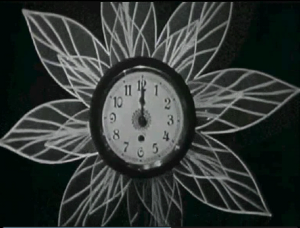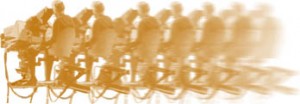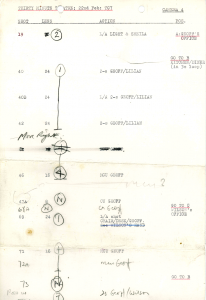… and the “PlaySchool” clock …
see also: Pinkoes and Traitors
Background
Bernie Newnham
I’ve been reading Jean Seaton’s book “Pinkoes and Traitors: The BBC and the Nation 1974-1987” , and have just gone through the early 1980s strikes, when the scene crews had everyone out at various points. I seem to remember that all that had its root, partly in the 1970s being the 1970s, but also in the BBC splitting show crews from setting crews. Didn’t they move the show crews to just days, and then get the set and light crews from the labour exchange?
Someone called Slasher Green rises in my memory…..
Roger Bunce, Barry Bonner
I remember the name ‘Slasher Green’. He was the boss of Mechanical Workshops.
The Scene Man might be ‘Smudger Smith’, who was a Scenic union rep. By the time I got to know him, he was elderly with a deaf-aid, and a lovely guy.
Dave Plowman
The logic behind the move of the show crews to just days was that they would save money by having people on permanent nights, rather than swapping over. But then you get the situation where those who built things weren’t around to answer if they were wrong or not finished, so was left to the day crew to sort. And didn’t the night guys know this, according to the day crews!
Rumour was the local police were regular visitors to night rigs after this was implemented.
Dick Blencowe
I remember turning up for TOTP when the Scene Guys were on strike, no set just black drapes. We didn’t rig anything until the Production team turned up to say the only bit we would be using the studio (TC8 I think) for was a pre record of Pans People. Cameras were rigged and a couple of fold back speakers. A pool of light in the centre with the cameras in a circle round it in the darkness. The girls in floaty white dresses almost transparent and not leaving much to the imagination danced in the lighted area to “Bridge Over Troubled Water”. The shots were left up to the camera men which included other cameras in the background but by turning off cue lights were not noticeable. A very successful recording leaving everybody congratulating themselves. Who needs a set anyway and we went home after lunch.
Dave Mundy
… and I remember turning up to do a Leo Sayer Show, no set, did the 2-day show the next day, a bit hectic!
Geoff Fletcher
There must have been some sort of dispute with the scene crews in the late 1960s too. I dimly recall going to TC to do a “30 Minute Theatre” and finding no set – only black drapes. Can’t recall what happened next – I shall have to consult the old Fletch diaries again!
Not the same episode, but here is a shot card from another “30 Minute Theatre”:
(Click on the picture below to see a larger or clearer version of this picture:
Click the “X” button (top right) to close the newly opened picture.)
David Brunt
The scene crews went out in Summer 1969. There was another (shorter) strike around December that year.
Play School Clock and Union Disputes

Roger Bunce
According to “Pinkoes and Traitors … ” (the latest volume of official BBC history) there was once an inter-union dispute over the “Playschool” clock.
Should it be operated by the Sparks, because it was electrical, or was it a prop?
I worked on “Playschool” countless times, and often did the clock shot. I can’t remember who operated it, but I never recall any friction about it.
In my attempts to research what happened in my life, so that I can write it up for the Pensioners’ Association, I have encountered a number of stories of intransigent Unions, in the bad old days, but, on checking, they’ve proved to be untrue.
For example, I was told of an occasion where “…The Unions refused to overrun…”, but, on checking, it was the Producer who vetoed the overrun, because he was going over-budget. No Unions were involved.
On another occasion, “…The Unions objected because of Health and Safety…”. On checking, it was the Studio Management Safety Officers who objected. Again there was no Union involvement.
And I’ve heard of who-does-what disputes, again blamed on unspecified Unions, which were actually inter-departmental disputes. Again, nothing to do with any Unions.
The “Playschool” Clock seems to be the most lingering of these stories, so I just wondered if anyone could give me chapter and verse, or an eye witness account.
Albert Barber
The clock was operated by prop boys as far as I can remember and during the Sparks strike they said it was theirs. It was a front page piece in “The Sunday Times” I think.
There was much disruption about this time when production and presenters couldn’t move units or captions and also on one occasion we did a whole “Playschool” with someone else’s lighting rig.
Bristol OBs were sent to do a Maunday ceremony and were instantly part of the dispute. I went to Checkland and it was part of a big plan to make the dispute total by management I suspect to get the public or government aware of the dispute. As Checkland said to me “…There is more to this than you know..”.
Alec Bray
Well, there was at least one occasion when “…The Union refused to overrun…”. It was during my time at the Beeb, and when I was working on “Softly Softly”, so I am guessing that it happened about 1966.
I have tried to find more information about this dispute on the internet, but unfortunately I can’t find anything (yet). This is what I remember.
The dispute was called by the ABS and particularly concerned Engineering rather than Tech Ops, and was scheduled to last for several days: as I recall, on the crew we were not desperate to “work to time” although we agreed with the aims of the ABS in terms of the goals it was trying to achieve. We were seriously aggrieved, however, that the dispute was not reported correctly in the newspapers of the time – and it was a salutary lesson to me to be very wary about what one reads in the papers, as the newspaper reports were decidedly incorrect as to the basis of the dispute and as to the action to be taken and its effects.
What was proposed as the industrial action was that “Engineering” (if I can use that word loosely) were to “unplug” lines at the time scheduled, irrespective of what was going on. Now, this did not necessarily mean that the lines from the studio to central control were to be pulled with the programme still on air – but only when the scheduled time to do this operation came. Basically, if everything ran to time, there would be no disruption.
In effect, however, it meant that if a programme was scheduled to run to, say, 21:00, dead on the stroke of 21:00 the lines would be “pulled” (“derigged”, whatever). Normally at this time, if during rehearsal a programmes was found to be overrunning, sometimes the Gallery would ask Network Control for an overrun – but more usually the Floor Manager just went around during TX saying “Pacey! Pacey!”.
The live episode of “Softly Softly” which we did during this industrial action certainly had “pace” – we UNDERRAN by FOUR minutes (which is not bad for a 50 minute programme).
A David Nixon live programme broadcast later during this industrial period had a David Nixon looking visibly worried during the programme.
As to the cause of the dispute? Just can’t remember!
Roger Bunce
“Pinkoes and Traitors … ”, in the bit called ‘The Unions’, I think is trying to say how militant the unions were in the bad old days, but the only examples it can quote are the 1979 lock-out, which it totally mis-represents (for the true story see “Roger Bunce and the TM’s Dispute”), and the “Playschool” Clock. But, if the “Playschool” Clock didn’t become an issue until the Sparks’ strike, in Michael Chequebook’s time, (I think I remember that one, if only because it involved John Barlow and various other managers wandering about with Sparks’ poles!), then this would have been AFTER the time period covered by the book.
Peter Neill
I seem to remember that one consequence of the “PlaySchool” Clock issue was that the “Blankety Blank” revolving stage was operated by a couple of scene hands with a crank handle. I believe that it was originally planned to have an electric motor, but they decided to play it safe.
Roger Bunce
Still puzzling about that “Playschool” clock. If the Sparks had problems about that, what about roller captions? or anything else with an electrical component?
Dave Plowman
It’s an interesting point. Did Sparks actually plug up the roller? I really can’t remember. Perhaps it plugged into tech supplies so wasn’t classified as Sparks ‘property’?
If I recall correctly, the “PlaySchool” clock was just fed from a 13 amp socket on an extension. No dedicated switch like a roller caption machine.
Bernie Newnham
I keep meaning to write a letter to “Prospero”, where“Pinkoes and Traitors” got a glowing review from someone. Even forgetting the endless factual errors pointed out by Louis Barfe and David Elstein, the book isn’t about “The BBC and the Nation” (subtitle), it’s about a small part of the BBC and a very small part of the nation. It’s about the time when the BBC was at its television peak, but you’d never know it. And there’s no mention of “Good King Memorex” and its ilk, which I feel show the sort of people the BBC staff really were, rather than the striking militants, who didn’t give a stuff, that were portrayed.
Graham Maunder
I do remember from when I joined (Feb 1978 – A51) I seemed to spend the first few Decembers on strike or working to rule.
I even remember having to get a job as a courier van driver on the second occasion as I had just moved from home into a rented pad in Wembley and wouldn’t have been able to pay my rent without the extra income! Also remember being severely bollocked by the owner of said courier company (Panic Parcels!) when they couldn’t get hold of me for an hour or more as I was attending a union meeting in the pub behind Television Centre (The General Smut??). Blamed the radio as I recall – thereby continuing a long history of cameramen blaming sound!
Anyway, I definitely remember working on a “PlaySchool” where the classic ‘zoom out from the clock and tilt down then zoom in to whatever was on the turntable’ shot wasn’t done in the same way as there was an ongoing dispute about whether the clock was a prop or an electrical item and therefore whether it should be operated by a Spark or a show worker (was that what they were called?)
This doesn’t answer the roller caption question though – had they perhaps had their day by then?
Still, at least Television Centre existed and turned out some amazing programmes then with overnight turnarounds and 19 crews when I started.
And we drank at lunchtime!
Roger Bunce
That big dispute would have been the T.M.’s dispute of 1979, which was more of a lock-out than a strike (see the Tech-Ops site, as previously mentioned). Yes, I remember that meeting in a pub.
If you encountered a problem with the “PlaySchool” clock about that time (late 1970s), it would accord with the “Blankety Blank” turntable story (started 1977). Which poses another question, since “PlaySchool” started in 1964, why did it take them so long to decide that there was a problem with the clock?
John Howell (Hibou)
I do recall that some of us on sound suggested the use of an old wind-up gramophone motor to drive the clock turntable. Zero to 78rpm in silence and no argument as to who started and stopped it!
Pat Heigham
That would be a Grams Op, then!
When Ian Leiper was on Grams, TC1 only had a bank of 2 turntables, which Ian thought was underequipped.
He was experimenting with an Edison cylinder player, and had the Tech Assistant boys solder a ball-point ball to the shank of a stereo cartridge to track the grooves (as the cartridge had the vertical compliance needed).
Plugged into the desk, it didn’t sound bad!
Enter Sam, who spied it and said “What ARE you doing with that?”
Ian: ” ‘cos you won’t give me another two turntables!”
As regards who does what, I recall a lighthearted moment in TVT.
A pony on stage, and the inevitable: tail up and a load dumped! I think the FM was Paddy Russell, who called: “Studio Attendant!” A voice from behind the scenery replied: “If it’s steaming, it’s Special Effects!”
A little story about overruns:
Riverside Music Studio – formerly the old film scoring stage. Evening session for music for an LE show – Len Shorey on the desk, me looking after the Studers and score reading. Taking the last number, Len suddenly swore: “I’ve missed the clarinet entry!” There was about 5 mins to the end of the session – not enough time to re-take from the top of the number (overran meant a complete whole extra session fee for the band).
I looked at the score, thought I could edit from 5 bars before letter F, but please don’t alter the strings fader setting (quivering strings under the main melody). Retake canned, band went home at 11pm. No extra session fee. Len says: ” Are you going to do the edit now, or tomorrow?”
I decided to make a copy and test it. Shaving microscopic bits of 1/4″ I eventually made it work, and went home at midnight, ready to repeat it on the master tape next day.



